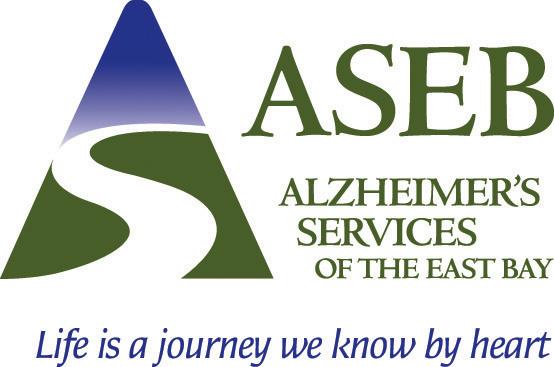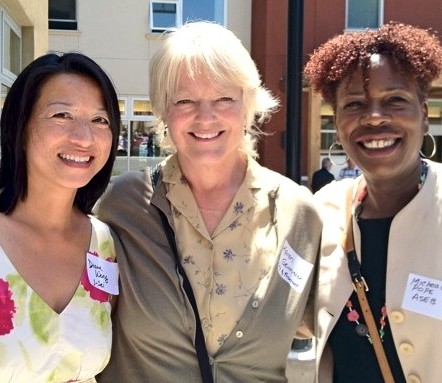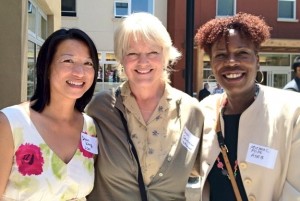 ASEB’s executive directors, past and present. From left to right: Diane Wong (1989-1995), Karen Grimsich (1995-2007) and Micheal Pope (2007-present).
ASEB’s executive directors, past and present. From left to right: Diane Wong (1989-1995), Karen Grimsich (1995-2007) and Micheal Pope (2007-present).
ASEB is kicking off its 25th anniversary year with a new logo, a fundraising campaign with the goal of raising $250,000, and a host of events and services that will bring ASEB closer to its community. “We’re marking this anniversary with a new look, a new name, a re-commitment to our core values, and a re-visioning of the way we operate,” says Executive Director Micheal Pope. As part of the shift, ASEB will be the official name of the organization, rather than the more unwieldy Alzheimer’s Services of the East Bay. The new logo reflects this change.
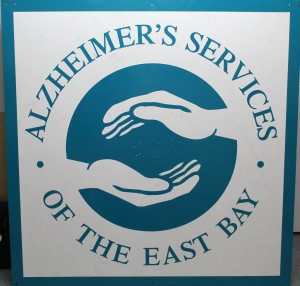 Diane Wong, Executive Director of ASEB from 1989 until 1995, reflected on the change from the original logo, which was created at ASEB’s conception in 1988. “In the past 25 years you have seen quite an evolution both visually with the logo and the world of adult day services. In the late 1980s programs could be small mom and pop centers. This model is now economically unfeasible. We used to have a state system that was supportive of creating progressive aging services and now programs are looked at as a drain on the budget, open to every cut and slash that can be delivered. To survive, centers have been forced to operate in such a state of efficiency that private companies could learn a thing or two from them.”
Diane Wong, Executive Director of ASEB from 1989 until 1995, reflected on the change from the original logo, which was created at ASEB’s conception in 1988. “In the past 25 years you have seen quite an evolution both visually with the logo and the world of adult day services. In the late 1980s programs could be small mom and pop centers. This model is now economically unfeasible. We used to have a state system that was supportive of creating progressive aging services and now programs are looked at as a drain on the budget, open to every cut and slash that can be delivered. To survive, centers have been forced to operate in such a state of efficiency that private companies could learn a thing or two from them.”
 Karen Grimsich, who was at ASEB’s helm from 1995 until 2007, recalled the moment that ASEB’s tagline was created. “We had a subgroup of board members at the meeting where Ann McDonald said the words ‘Life is Journey we Know by Heart’ and the room was silent a full moment before the collective sigh. We had found a tag line that represented our philosophy of care so well. There was not a question raised about whether that was ‘the one’. There was an immediate vote of approval—then it was a matter of looking at colors. The S in the logo represented a journey. Living with dementia is a journey for all.”
Karen Grimsich, who was at ASEB’s helm from 1995 until 2007, recalled the moment that ASEB’s tagline was created. “We had a subgroup of board members at the meeting where Ann McDonald said the words ‘Life is Journey we Know by Heart’ and the room was silent a full moment before the collective sigh. We had found a tag line that represented our philosophy of care so well. There was not a question raised about whether that was ‘the one’. There was an immediate vote of approval—then it was a matter of looking at colors. The S in the logo represented a journey. Living with dementia is a journey for all.”
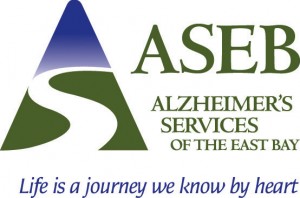 Wong notes how ASEB has both changed, and how it has remained the same. “As the years progressed, technology and science have moved forward and with the evolution of consumer control and choice, there seems to be a greater emphasis on seeing dementia care as an ongoing process where families must look down the road, into the future, in order to create a path that best fits them,” she says. “What remains consistent is the dedication and commitment to participants and families. The respect, health care and support received is life saving, and I hope the providers can continue their journey despite the many road blocks that have been set forth by a society and public system that don’t effectively plan for the future. Here is to another 25 years!”
Wong notes how ASEB has both changed, and how it has remained the same. “As the years progressed, technology and science have moved forward and with the evolution of consumer control and choice, there seems to be a greater emphasis on seeing dementia care as an ongoing process where families must look down the road, into the future, in order to create a path that best fits them,” she says. “What remains consistent is the dedication and commitment to participants and families. The respect, health care and support received is life saving, and I hope the providers can continue their journey despite the many road blocks that have been set forth by a society and public system that don’t effectively plan for the future. Here is to another 25 years!”
